Herb & Jamaal are talking to me (crosspost from Lang Log)
I swear Herb and Jamaal are trying to send a message to linguists. But what?
Maybe they're just trying to catch the attention of linguists, and then the message is coming later. If that's the plan, they're succeeding with me. Here's today's cartoon:
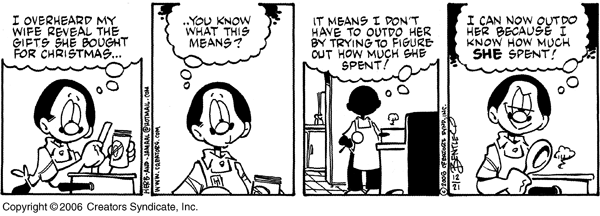
Do you see what I mean? Isn't that bolding in the ultimate panel on the wrong word? I take it to indicate contrastive stress. But for the joke to work the way I think it's supposed to work, the bolding ought to be on the verb know. See, there's a whole lecture in this cartoon about how contrastive stress is introduced by a speaker to distinguish two parallel propositions with a single distinct element, in this case, the different predicates taking 'how much she spent' as a complement, trying to figure out versus know. This cartoon seems odd because the stress is indicated on a non-contrasting element, she, instead. (I don't think there's any other character who she could be referring to that would contrast with my wife). Depending on the direction of the lecture, you could talk about the phonetic properties associated with contrastive stress, or the semantics of the contrasting propositions, or their syntax (island effects appear, I believe). All blogworthy stuff, really, but seemingly based on nothing more than just an accident of inking.
But this is far from the first time H&J have produced this kind of 'accident'.
Just a few days ago, pretty much at the three-week point after the Brizendine kerfuffle, H&J published this:
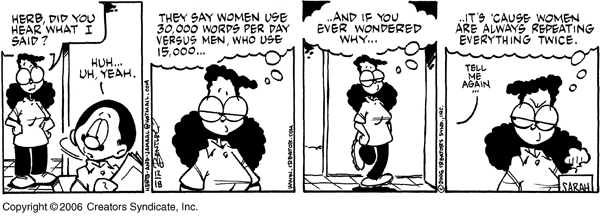
I nearly posted under the title, 'Noooooooo!' but then thought really, the less said the better. But then this thing today...and see, I've been saving up H&J's for a post on 'whom' someday, because as far as I can tell they are the last bastion of whom in modern-day America, certainly on the funny pages. Check it out:
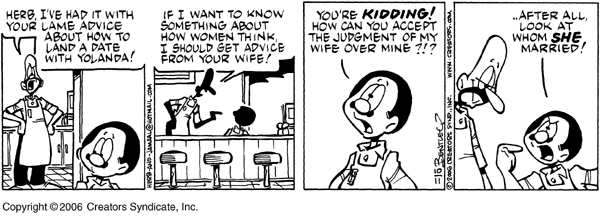
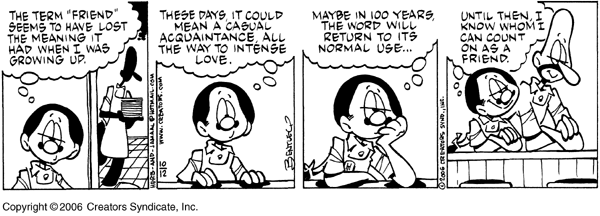
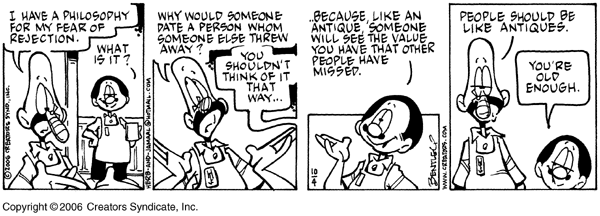
It's not just one character who says 'whom', so it's not supposed to just be a personality quirk, but rather a whole community of speakers for whom (!) straight-up, prepositionless accusative whom is still au courant. I was going to post about how it really leaps out as a marked/odd usage to me in the context of a cartoon, where the norm is for the dialogue to be represented in fairly colloquial style, lots of contractions and informal speech, even some &*$%&!!# now and then.
And then, also not long ago, this was the Sunday strip:
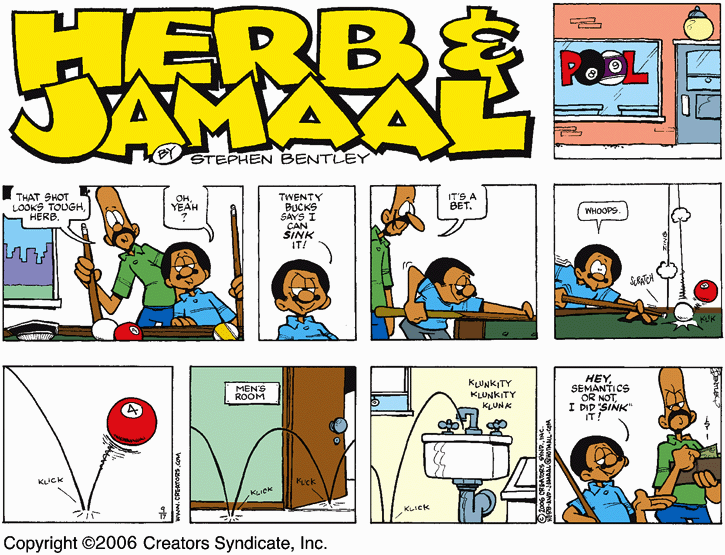
This one illustrates the nonce formation of a denominal location/locatum verb meaning 'to put/get into a sink' (like to corral, to box, etc.), a process that I've been professionally interested in. Moreover, this particular denominal verb is homophonous with an irregular English verb, sink, meaning 'to descend', past tense sank, participle sunk. The difference between the nonce denominal verb sink and the established irreguar verb sink has been experimentally investigated by Steven Pinker, inter alia. Subjects reliably form the past tense of denominal sink as sinked, not as sank, illustrating the psychological reality of the invisible layer of nominal structure which verbalizes the noun in the denominal verb.
[sink]V + past = sank
[[sink]N]V + past = sinked
So this cartoon is basically another whole lecture (or a whole nother lecture). And of course there was the cartoon from a few weeks ago presenting an opinion about the use of nigger. And a few months ago, there was this cartoon, which has so far occupied several precious hours of my conscious existence:

This one incorporates a version of a semi-famous example sentence as the punchline, illustrating the peculiar problem of parsing a negation inside a too/enough-construction. (For some technical discussion of the properties of these constructions, you could see this paper). I blogged about this cartoon here before; see the comments for a dramatic debate between readers who blinked at the cartoon (like me) and readers who didn't.
So anyway, I'm starting to think that H&J are trying to tell us something. Or maybe their creator is reading some linguistics on the side and he's just messing with me. Or maybe I'm developing a worrisome degree of paranoia. I'll let you know if I ever figure it out.
